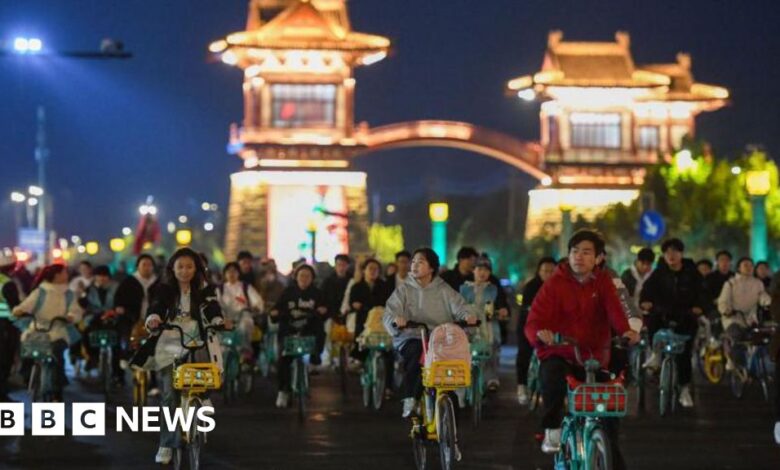Thousands of cyclists block roads in China looking for dumplings at night

It started as a search for dumplings on social media, but ended with thousands of cyclists causing traffic jams between two cities in central China.
What should have been a boost to the economy of the ancient city of Kaifeng backfired when the trend spread – tens of thousands of people rented bicycles cycling all night from nearby Zhenghou for breakfast.
The six-lane highway between the two cities quickly filled with cyclists. Police used loudspeakers to tell them to leave and bicycle rental companies warned they would remotely lock bicycles taken out of Zhengzhou.
The event is part of a trend of cheap travel among young Chinese at a time when the economy is slowing and job prospects are scarce.
The trend was started by four college students cycling 50km (30 miles) from Zhengzhou to Kaifeng in June to try guantangbao, a type of soup dumpling.
“There is only one youth, you have to try an impromptu trip with friends,” one of the four people told local media.
That message resonated with other young people in the city of 12.6 million people, at a time when many in China complain of burnout due to an overly competitive job market.
A trend on social networks called “Night trip to Kaifeng” was born. State media initially praised the trend as an expression of the “passion” of young people.
Local authorities see this as an opportunity to regenerate instant reputation that the town of Zibo acquired last year because of its grill.
In the wake of Friday night’s standoff, Kaifeng officials even announced special discounts and events for college students. They also introduced additional traffic control measures to protect cyclists.
Ms. Li, 27 years old, rode a motorbike to Kaifeng with students on Friday night. She said she saw an article about this trend and decided to participate and “live like a teenager for once.”
“Everyone was full of energy and interacting with everyone around them. It felt just like my college days,” she told the BBC.
There was a heavy police presence along the way, she said.
“You can see ambulances and traffic police cars on both sides of the road quite often and there are also drones flying in the sky to monitor traffic,” she said.
But the happy mood soon changed. The roads in Zhengzhou began to be overwhelmed by thousands of bicycles.
Images circulating online show severe congestion on main roads from Zhengzhou to Kaifeng. A witness told local media Jimu News that he drove the same route, which usually takes an hour, but it took three hours.
Some riders shared on social networks that they were forced to get off their bikes and squeeze through the crowd.
There was no official estimate of the number of bicycles on the road on Friday night. But reports on social media suggest the number ranges from 100,000 to 200,000.
Many people who reach Kaifeng do not have a good time.
A viral post from a student, who cycled for more than seven hours, said they couldn’t get a taxi or a hotel room because demand was so high.
“I really regret going. While eating in the restaurant, I heard the owner criticize university students for not having anything to do… I’m really sorry for affecting the people there.” Kaifeng,” the student said on social networks. Xiaohongshu platform.
As congestion worsens, three major bike rental platforms in China issued a joint statement urging students to use trains or buses for long-distance travel and avoid using bicycles. at night for safety reasons.
By Saturday afternoon, the companies had begun charging people to ride to another city.
Multiple posts show that several universities in Zhengzhou have now asked students to return to dormitories and imposed restrictions on them leaving campus.
Some social media users criticized cyclists for “irresponsible” behavior such as littering.
Traffic police in both Zhengzhou and Kaifeng blocked several main cycling lanes between the two cities on Saturday and Sunday.
It is also not surprising to see the two city governments push back because Chinese authorities have always suppressed large gatherings to ensure stability.
Last month, Shanghai police quietly celebrate Halloween out of concern that the raves could become a platform for dissidents.
But Ms. Li believes that events and trends like Night Trip to Kaifeng will continue to attract young Chinese.
“People are very stressed these days so these events are a good thing. Because happiness is contagious.”




